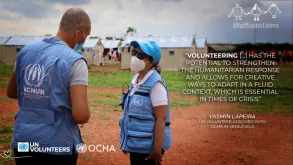UN Volunteers Rosana Jimenez and Yasmin Lapeira began serving with the United Nations Office for the Coordination of Humanitarian Affairs (OCHA) in Venezuela during one of the most difficult moments in recent times. Both UN Volunteers took up their assignments when the pandemic hit South America last spring. Yasmin was deployed in Venezuela thanks to the Special Voluntary Fund (SVF), of the United Nations Volunteers (UNV) programme with funding from a number of donors.
Rosana and Yasmin’s assignments focus on understanding humanitarian needs in the states covered by the Maracaibo Field Coordination Hub (Trujillo, Falcón, Lara, and Zulia). Rosana is based in Lara and Yasmín covers all the states of Maracaibo. Through conversations with the local communities and local organizations on the ground, these two women UN Volunteers track humanitarian assistance requirements in each area. Their efforts connect different actors providing humanitarian assistance for people in need and contribute to expanding the operations of OCHA more effectively in the region. To "begin to collaborate with the OCHA during COVID-19 was not ideal, but we managed to do our best," Yasmin explains.
Of course, their assignments became unusually complicated due to the pandemic, travel restrictions, and the need to avoid the risk of infection. "Faced with the impossibility of meeting people in their communities, we communicated through the telephone and other platforms over the internet," Yasmin says.
UN Volunteer Rosana Jimenez agrees and explains further. “At first, I felt frustrated by the difficult situation we are living in and the impossibility of going more often to the field, but this has allowed me to come up with innovative solutions and learn more about the reality of vulnerable people and civil society organizations that operate in my area.”
Many local civil society organizations are working on different issues that complement the work of OCHA in the region. These range from adolescent pregnancy, gender-based violence, people with disabilities, and nutrition. In this regard, these UN Volunteer assignments are important to coordinate who is addressing what issues in each region and community.
“Volunteering is a very good way to have new points of view through the incorporation of people who are new to the organization and have valuable perspectives with deep knowledge of their areas of origin. This has the potential to strengthen the humanitarian response and allows for creative ways to adapt in a fluid context, which is essential in times of crisis,” Rosana says.
Rosana also highlights the importance of their mission as facilitators of contact between government entities, humanitarian organizations, and the affected people: "I think that without volunteers, many things would not be done. We try to give a voice to others, to vulnerable communities, and that is absolutely necessary to understand the actual needs of the local population."
"Project participants, people in need, must always be at the center of the humanitarian response," Yasmin explains.
To achieve this goal, she acknowledges that it is key to listen to beneficiaries' views on the aid they are receiving. “Sometimes you start a project with some ideas of what should be done, but this vision may not be shared by the people we are seeking to support. Therefore, it is essential to listen to them and, if necessary, adjust the way we provide assistance”.
Humanitarian work is carried out by strengthening the dialogue with communities and that is what the pilot project, “Community Voices” (Voces de la Comunidad, in Spanish), where the UN Volunteers are involved, is trying to achieve. The initiative contacts key leaders and stakeholders in communities through instant messaging or web conferences to listen to their perspectives. Through this initiative, the UN Volunteers were able to gather valuable information that has helped inform the OCHA projects and programmes. "On our end, we develop regular updates about the situation in Lara," Rosana explains in regard to her assignment. "Several humanitarian organizations share with us information on their current projects and OCHA helps them coordinate their actions to make them more effective.”
Asked about her feelings as a volunteer, Rosana smiles.“For me, serving with OCHA as a UN Volunteer has been a unique experience, it has allowed me to realize that there is so much to be done out there. Getting to know these realities first hand has opened my eyes.”
This article was prepared with the kind support of Online Volunteer José María Sainz Maza del Olmo.

